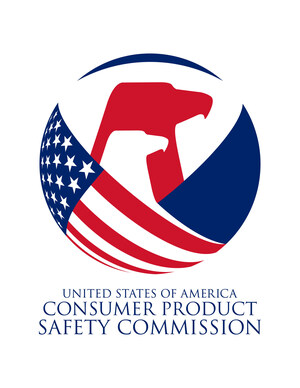WASHINGTON, Sept. 11, 2023 /PRNewswire/ -- The U.S. Consumer Product Safety Commission (CPSC) voted to approve a mandatory standard to reduce button cell and coin battery ingestion hazards to children six years and younger. These batteries are used in many types of consumer products from keyless entry remotes and wireless game controllers to toys and musical greeting cards. Pursuant to Reese's Law, CPSC voted to adopt the voluntary standard, ANSI/UL 4200A-2023 Standard for Safety for Products Incorporating Button Batteries or Coin Cell Batteries, as the mandatory consumer product safety rule for consumer products containing button cell or coin batteries. The Commission also established labeling requirements for button cell or coin battery packaging, to warn of the ingestion hazard to children.
Protecting Children
The stakes are high and the consequences of a child swallowing a button cell or coin battery can be immediate and deadly. These tiny batteries can burn through a child's throat or esophagus in as little as two hours if swallowed. From 2011 through 2021, CPSC is aware of 27 deaths and an estimated 54,300 injuries treated in emergency rooms associated with ingested or inserted button cell or coin batteries.
Reese's Law & ANSI/UL 4200A-2023
Reese's Law, enacted August 16, 2022, mandates that CPSC implement federal safety requirements for button cell or coin batteries and consumer products containing such batteries. These requirements do not apply to toy products for children under 14 if the products comply with the Toy Standard. Additionally, the law requires that any button cell or coin battery offered for sale, manufactured for sale, imported into the U.S., or included separately with a consumer product, meet the child-resistant packaging requirements in the Poison Prevention Packaging Standards after February 12, 2023. These packaging requirements do not apply to button cell or coin batteries manufactured or imported on or before February 12, 2023.
Consistent with Reese's Law, ANSI/UL 4200A-2023 requires either the use of a tool such as a screwdriver or coin to open the battery compartment, or the application of at least two independent and simultaneous movements to open by hand; additionally, such consumer products must pass a series of performance tests simulating reasonably foreseeable use or misuse. The standard also includes labeling requirements for consumer products containing button cell or coin batteries, and labeling requirements for consumer product packaging.
Safeguard children by taking control of button cell or coin batteries.
- Keep products with accessible batteries away from children if the battery compartments do not have a screw closure to secure them.
- If the battery compartment is damaged, replace the product as soon as possible, repair or dispose of the product.
- Toys with button cell or coin batteries are required to have a secure closure requiring a screwdriver, coin, or tool to open.
- Check the toys in your home to make sure battery compartments are secured.
- Do not allow children to play with or be in contact with button cell or coin batteries.
- Call the National Battery Ingestion Hotline (800-498-8666) or the Poison Help Line (800-222-1222) immediately for treatment information if you suspect a child has swallowed or is exposed to button cell or coin batteries.
Immediately take children who are suspected of having swallowed button cell or coin batteries to the nearest emergency department. The National Capital Poison Center recommends giving honey to children 12+ months on the way to the emergency room to reduce injury in the critical time between ingestion and when the battery can be properly removed. Do not delay going to the emergency room to obtain or give them honey. Give 10mL of honey every 10 minutes only for children 12+ months who have ingested button batteries in the past 12 hours. Do not exceed six doses of honey.
Commissioner Statements:
Chair Alex Hoehn-Saric
Commissioner Peter Feldman
Commissioner Richard Trumka
About the U.S. CPSC
The U.S. Consumer Product Safety Commission (CPSC) is charged with protecting the public from unreasonable risk of injury or death associated with the use of thousands of types of consumer products. Deaths, injuries, and property damage from consumer product-related incidents cost the nation more than $1 trillion annually. CPSC's work to ensure the safety of consumer products has contributed to a decline in the rate of injuries associated with consumer products over the past 50 years.
Federal law prohibits any person from selling products subject to a Commission ordered recall or a voluntary recall undertaken in consultation with the CPSC.
For lifesaving information:
- Visit CPSC.gov.
- Sign up to receive our e-mail alerts.
- Follow us on Facebook, Instagram @USCPSC and Twitter @USCPSC.
- Report a dangerous product or a product-related injury on www.SaferProducts.gov.
- Call CPSC's Hotline at 800-638-2772 (TTY 301-595-7054).
- Contact a media specialist.
Release Number: 23-283
SOURCE U.S. Consumer Product Safety Commission

WANT YOUR COMPANY'S NEWS FEATURED ON PRNEWSWIRE.COM?
Newsrooms &
Influencers
Digital Media
Outlets
Journalists
Opted In





Share this article